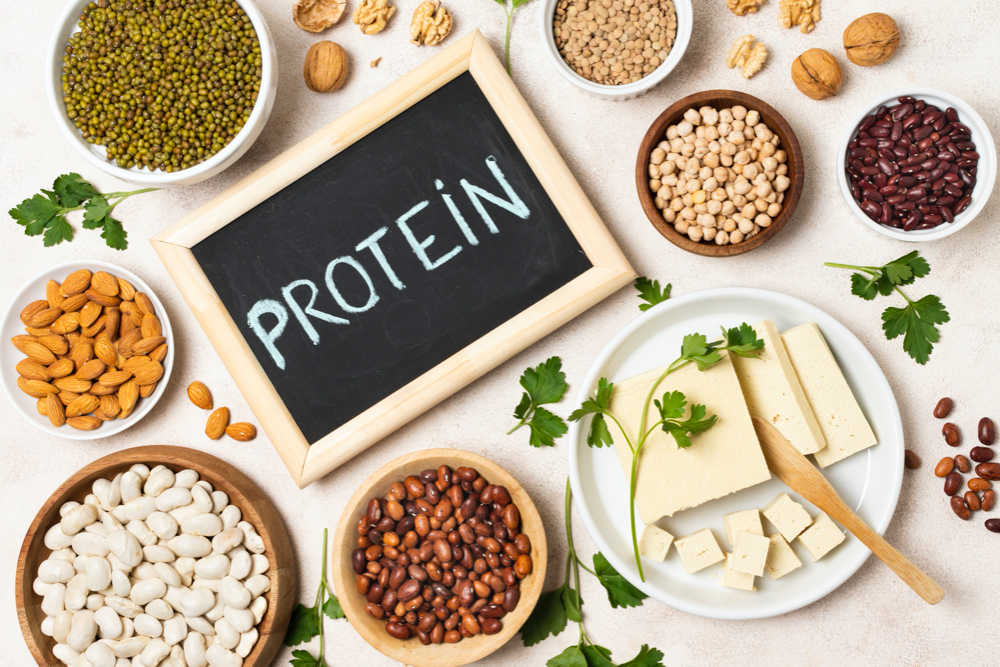
Is it harmful to eat too much protein? This isn’t just a hypothetical question but a valid concern, especially among fitness enthusiasts, athletes, and individuals who consume protein for bulking or strengthening. As you can expect, overindulgence of any food has adverse effects on your health, and protein is no exception. Read on to learn how we unravel the mysteries surrounding excessive protein consumption and its effects on the human body.
- Weight Gain
Protein is a renowned nutrient if you’re aiming for a lean physique. Thus, if you’re an athlete or fitness savvy, you’re most likely taking supplementary protein shakes or planning your meals around common sources like lean meat, soy, nuts, and leafy greens.
Although increasing protein intake promotes muscle development, many people overlook the fact that it also contains significant calories that could lead to weight gain. Thus, adding excessive protein sources to your diet can potentially cancel the muscle-building function of protein.
Additionally, certain high-protein foods may increase your cravings. This is true for protein sources with saturated fats or added sugars.
| Pro tip: There are many misconceptions about weight loss. Hence, consider working with a nutritionist or a healthcare provider to ensure you avoid common weight loss obstacles. Also, start your journey with the proper weight management tests to obtain baseline health information to help you achieve your goal. |
- Potential Liver Damage
Your liver may also experience strain as a result of excessive protein consumption. The liver detoxifies substances, metabolizes nutrients, and synthesizes essential proteins.
When the body is overwhelmed with excessive dietary protein, the liver may struggle to efficiently process these nutrients, leading to potential liver dysfunction and compromised metabolic processes.
| Pro tip: Overeating protein and other foods can cause problems in your liver. But other common habits can also have a similar effect. Check out what these liver-destroying habits are and how you can avoid them. |
- Adverse Impact on Bone Health
Not everyone knows that too much protein can negatively affect bone health. This has been evidenced by studies highlighting how excessive protein from animal sources heightens the release of calcium before it’s used, as well as bone depletion.
With this in mind, maintaining optimal bone health requires balancing protein consumption with adequate calcium-rich foods, such as dairy products, leafy greens, and fortified plant-based alternatives.
- Development of Digestive Problems
If your diet is protein-heavy, you can expect digestive problems as your intestines will have difficulties maintaining motility. In contrast, adding sufficient fiber (which is commonly found in plants) to your diet improves digestion and bowel regularity. Unfortunately, since many of the most popular high-protein foods are animal-based, they don’t have dietary fiber.
Without fiber-rich foods on top of protein overconsumption, you may experience bloating, digestive discomfort, gas, and constipation. You can counteract these symptoms by ensuring your protein sources are not exclusively animal-based and/or by adding enough fruits and vegetables to supply the necessary fiber.
| Pro tip: Bloating is a common sign of digestive distress. While it’s imperative to consult your doctor regarding recurring bloating, especially if it comes with other symptoms, you can find relief from this condition through home remedies for bloating. |
- Disruption in the Acid-Base Balance
Diets high in protein can disrupt the body’s acid-base balance, potentially leading to increased blood acidity. To counteract this acidic environment, the body may mobilize calcium from the bones to neutralize the acidity. This may contribute to potential bone mineral density loss.
Moreover, an acidic body can lead to premature aging, hormone imbalances, and age-related diseases, emphasizing the importance of maintaining a slightly alkaline pH.
- Increased Risk of Kidney Disease
Overindulgence in protein can strain the kidneys since they filter waste products from the blood, including the byproducts of protein metabolism.
When the body metabolizes protein, nitrogenous waste compounds are produced, placing an increased burden on the kidneys to excrete these byproducts. Hence, consuming protein without control can potentially lead to kidney disease or even kidney failure.
| Pro tip: It is of utmost importance to keep your kidneys healthy. If you are at risk of developing kidney disease, make sure to be mindful of your diet. Check out which foods best help kidney function, especially if you plan to adopt a renal-friendly diet. |
What Is The Recommended Protein Intake?

Adults should aim to consume approximately 0.8 grams of protein per kilogram of body weight per day. For bodybuilders, athletes, and those who are more physically active, your protein requirement could be higher to support muscle repair and growth. Work with your healthcare provider or nutritionist to come up with a more personalized protein intake.
Frequently Asked Questions

Is too much protein bad?
Yes, eating or consuming too much protein can have adverse effects on your health. It can overwork your liver and kidneys, leading to problems in maintaining their functions. It can also lead to weight gain and gastrointestinal issues. Plus, you may also experience health issues concerning your bone density.
Can you eat too much protein?
You could consume too much protein without noticing it if your diet is mostly comprised of meat. Unfortunately, animal-based foods also contain high levels of fats. Combining the excessive intake of both protein and fats can trigger cardiovascular conditions like heart disease and stroke.
What are the symptoms of too much protein?
There are no fixed or direct symptoms of protein overconsumption. In most cases, symptoms of conditions associated with a high protein diet, like kidney, liver, and bone problems, may also suggest too much protein intake. These symptoms may include but are not limited to fatigue, dehydration, constipation, nausea, abdominal pain, bad breath, and diarrhea.
The Bottom Line
The impact of excessive protein consumption extends beyond mere muscle metabolism and athletic performance. It also encompasses potential risks to organ health, bone integrity, weight management, and digestive wellness. That said, approach protein intake with mindfulness and moderation. Doing so allows you to harness its benefits while mitigating potential risks associated with overindulgence.



